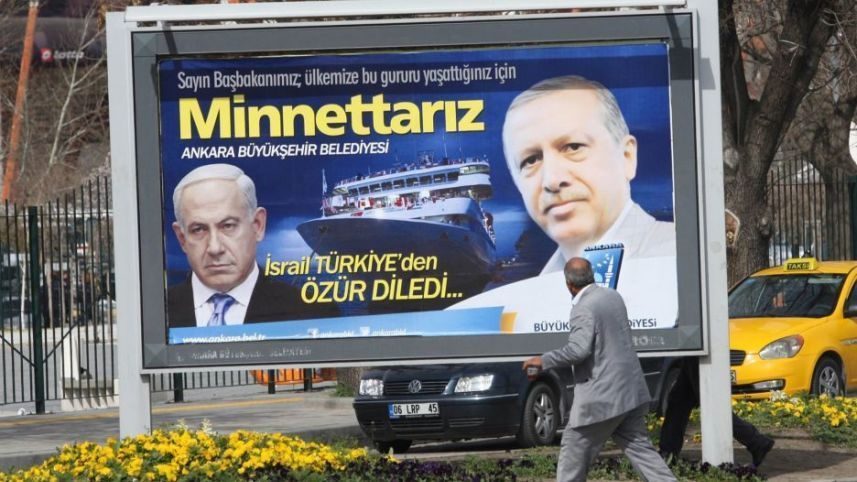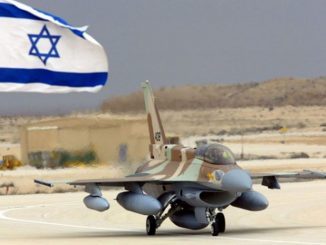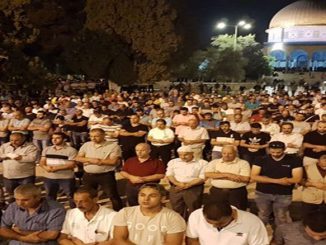
Turkey and Israel will this weekend announce a deal on normalizing ties, ending a years-long diplomatic crisis exacerbated by a deadly 2010 Israeli raid on a Gaza-bound flotilla in which 10 Turkish nationals died after IDF troops were attacked, a report said Tuesday.
The two sides would make the announcement during final talks on June 26 after intensive diplomacy resulted in a compromise agreement on the partial lifting of Israel’s blockade on the Gaza Strip.
The Compromise reached on Turkish demands regarding Gaza: Blockade won’t be lifted and Turkish aid will only arrive through Ashdod Port while Israel will approve Turkish aid projects and will remove restrictions on the entry of supplies and equipment from Turkey to Gaza.
Turkish officials told the “Hurriyet Daily News” that Israeli and Turkish negotiating teams will likely conclude a reconciliation deal during their June 26 meeting at an unnamed European capital. The Turkish officials’ comments confirm what senior officials in Jerusalem have said in recent days.
Turkey will be represented by Turkish Foreign Ministry Undersecretary Feridun Sinirlioğlu, who has conducted negotiations with Israel on Turkey’s behalf in recent years. Israel will be represented by chief negotiator Joseph Ciechanover, the prime minister’s envoy who has followed the affair from the start, and deputy national security adviser Jacob Nagel. The meeting is aimed to pass a final draft agreement and confirm that there is an agreement an all matters.
Already-tense relations between former allies Israel and Turkey were significantly downgraded after Israeli commandos staged a botched pre-dawn raid on a vessel in a six-ship flotilla in May 2010 as it tried to run the Israeli naval blockade on Gaza. The commandos boarded the Turkish-owned Mavi Marmara, which was the only vessel in the flotilla to ignore repeated calls to halt, and were attacked with clubs and metal bars as they hit the deck. Nine activists on board the Mavi Marmara were killed in the ensuing fighting, with a tenth later dying of his wounds, sparking a bitter diplomatic crisis. Several IDF soldiers were seriously wounded in the fighting aboard the ship.
Two of Turkey’s key conditions for normalization — an apology and compensation for the raid — were largely met, leaving its third demand, that Israel lifts its blockade on the Hamas-run Gaza Strip, as the main obstacle.
Under the reported terms of the deal, Israel will allow the completion of a hospital in Gaza, as well as the construction of a new power station and a seawater desalination plant for drinking water.
Israel imposed its blockade in June 2006 after Hamas fighters killed two IDF soldiers and kidnapped Cpl. Gilad Shalit in a cross-border raid. The restrictions were tightened a year later when Hamas took control of the enclave in a violent overthrow of the Fatah-led Palestinian Authority. The blockade is designed to prevent Hamas, the Islamist terror group that still runs Gaza, from importing weaponry.
Meanwhile, Turkey will send aid to Gaza via the Israeli port of Ashdod rather than sending it directly to the Palestinian enclave, the paper said.
The announcement would be made after talks between top Turkish foreign ministry official Feridun Sinirlioglu and Israel’s point man on Turkish relations, Joseph Ciechanover, the report said.
It did not say where the talks would be held.
The two diplomats would then meet again in July to formally sign the agreement, after which ambassadors would return to the respective embassies and full ties would be restored.
The Hebrew Channel (1) reported Sunday that Israeli and Turkish negotiating teams were set to meet in a European capital on June 26. Also on Sunday, a senior Israeli official said the rapprochement negotiations were almost complete, and confirmed that an agreement to reestablish normalized ties between the two countries could be announced in “a matter of days.”
“Almost everything has been finalized. We’ve concluded over 95% of the negotiations, there are only a few details remaining. It could be a matter of days,” the official said, according to the Hebrew-language Ynet website.
The official noted the political leadership in both countries was eager to upgrade diplomatic ties after six years.
“There is no reason this won’t happen,” he said.
Compromise on the last outstanding issue — an Israeli demand to shut down Hamas’s Istanbul headquarters — was reached in recent weeks, the official said.
He said positive steps toward normalization had been taken by Turkey recently, most notably Ankara’s lifting of its NATO veto on cooperation with Israel. He also said that for the first time, a number of senior Turkish foreign ministry officials attended the Israeli Independence Day celebration at the Ankara embassy in May.
Analysts have said Turkey may pursue a more conciliatory foreign policy following the departure of former prime minister Ahmet Davutoglu, who spearheaded an aggressive and interventionist strategy.
His successor Binali Yildirim last week said he wanted no permanent tensions with the Black Sea and Mediterranean neighbors after serious ruptures not just with Israel but also with Egypt and Russia.
The senior Turkish officials told Hurriyet that immediately after the reconciliation agreement is officially signed in July, the process to normalize ties will begin. Ambassadors will be appointed and diplomatic relations will be raised to the highest level. According to the officials, the two countries will lift sanctions and restrictions with regard to international agreements, as well as joint military exercises, energy cooperation and import and export of defense equipment.
The senior Turkish officials added that Israel and Turkey have reached a compromise on the third condition posed by Ankara – lifting the siege on Gaza. Turkey in effect gave up on a full elimination of the siege on Gaza and the easing of the maritime blockade. As per the agreement, Turkey can send aid to Gaza but it has to pass through Israel’s Ashdod Port.
Israel also agreed to let Turkey build a hospital in Gaza and lift all restrictions on the supply of equipment, drugs, and staff to the medical facility. Jerusalem also approved the construction of a power plant in Gaza, which Turkey will build in collaboration with Germany, as well as the construction of a desalination facility.



